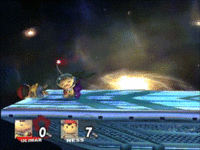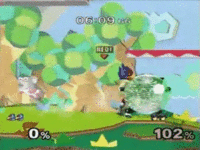Gimp
A gimp is the action of KOing a recovering opponent by interrupting their recovery, often with a rather weak attack that would not KO the opponent otherwise. Gimps tend to involve hitting an opponent off the stage followed by interrupting their recovery, capable of resulting in sometimes earlier KOs; simply interrupting a recovery that is otherwise sure to succeed can also be considered a gimp. Gimps put a large swing on a match, as they can happen at very low percentages, sometimes saving over a hundred points of damage needed to KO the opponent. Sometimes the term "gimp" is used to describe accidental SDs due to failed recoveries.
Gimping is related to and sometimes confused with edge guarding. Ganondorf hitting an opponent at 125% offstage with a sweetspotted up aerial and KOing them would not be considered a gimp, but just successful edge guarding. However, Ganondorf hitting that opponent at 50% with a reverse up aerial, semi-spiking them and causing their recovery to fail, would be considered a gimp.
Common examples of gimps include:
- Interrupting the double jump of a character that needs it to recover (e.g. Yoshi); this can prove especially deadly when interrupting at the beginning of the jump
- Blocking haltable recoveries such as Ness's PK Thunder or Ike's Quick Draw
- Edgehogging characters with tether recoveries
- Using non-flinching attacks such as F.L.U.D.D. or Water Gun to push an opponent using their recovery farther away from the stage
- Using the grab release glitch to deprive characters including Snake, Sonic, Mr. Game & Watch, and Pit of their recoveries
- Using an aerial attack to knock an opponent underneath the stage or into a stage spike
- Hitting a recovering opponent with a semi-spike or meteor smash that is not strong enough to outright KO them, but causes their recovery to fail
- Hitting a fast-faller with a weak attack off the edge of a stage with a high bottom blast line, causing them to plummet before they can react
- Using projectiles such as Sonic's spring to interrupt the opponent's recovery
- Footstooling a recovering opponent, which due to the brief moment of tumbling down, can potentially cause them not to be able to make it back on stage.
A bonus somewhat related to gimping exists in Melee called Shameful Fall; it's granted by being at 50% or less and being KO'd by an opponent with 100% or more. The bonus penalises 1500 points.

